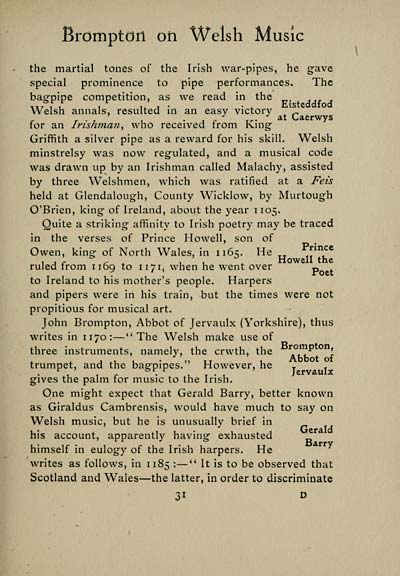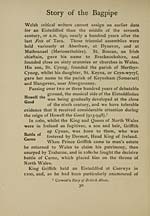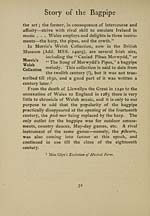Inglis Collection of printed music > Printed text > Story of the bagpipe
(57) Page 31
Download files
Complete book:
Individual page:
Thumbnail gallery: Grid view | List view

Bromptdtl on Welsh Music
the martial tones of the Irish war-pipes, he gave
special prominence to pipe performances. The
bagpipe competition, as we read in the
Welsh annals, resulted in an easy victory „
r t ■ i u • a t ~ v at Caerw y s
for an Irishman, who received from King'
Griffith a silver pipe as a reward for his skill. Welsh
minstrelsy was now regulated, and a musical code
was drawn up by an Irishman called Malachy, assisted
by three Welshmen, which was ratified at a Feis
held at Glendalough, County Wicklow, by Murtough
O'Brien, king of Ireland, about the year 1105.
Quite a striking affinity to Irish poetry may be traced
in the verses of Prince Howell, son of
Owen, king of North Wales, in 1165. He TT ^f in f ce
1 a c « * u u 4. Howell the
ruled from 1169 to 1171, when he went over p
to Ireland to his mother's people. Harpers
and pipers were in his train, but the times were not
propitious for musical art.
John Brompton, Abbot of Jervaulx (Yorkshire), thus
writes in 1170: — "The Welsh make use of
three instruments, namely, the crwth, the *??!? ° n 'r
trumpet, and the bagpipes." However, he . .
gives the palm for music to the Irish.
One might expect that Gerald Barry, better known
as Giraldus Cambrensis, would have much to say on
Welsh music, but he is unusually brief in
his account, apparently having exhausted
himself in eulogy of the Irish harpers. He
writes as follows, in 1185 : — " It is to be observed that
Scotland and Wales — the latter, in order to discriminate
31 D
the martial tones of the Irish war-pipes, he gave
special prominence to pipe performances. The
bagpipe competition, as we read in the
Welsh annals, resulted in an easy victory „
r t ■ i u • a t ~ v at Caerw y s
for an Irishman, who received from King'
Griffith a silver pipe as a reward for his skill. Welsh
minstrelsy was now regulated, and a musical code
was drawn up by an Irishman called Malachy, assisted
by three Welshmen, which was ratified at a Feis
held at Glendalough, County Wicklow, by Murtough
O'Brien, king of Ireland, about the year 1105.
Quite a striking affinity to Irish poetry may be traced
in the verses of Prince Howell, son of
Owen, king of North Wales, in 1165. He TT ^f in f ce
1 a c « * u u 4. Howell the
ruled from 1169 to 1171, when he went over p
to Ireland to his mother's people. Harpers
and pipers were in his train, but the times were not
propitious for musical art.
John Brompton, Abbot of Jervaulx (Yorkshire), thus
writes in 1170: — "The Welsh make use of
three instruments, namely, the crwth, the *??!? ° n 'r
trumpet, and the bagpipes." However, he . .
gives the palm for music to the Irish.
One might expect that Gerald Barry, better known
as Giraldus Cambrensis, would have much to say on
Welsh music, but he is unusually brief in
his account, apparently having exhausted
himself in eulogy of the Irish harpers. He
writes as follows, in 1185 : — " It is to be observed that
Scotland and Wales — the latter, in order to discriminate
31 D
Set display mode to: Large image | Transcription
Images and transcriptions on this page, including medium image downloads, may be used under the Creative Commons Attribution 4.0 International Licence unless otherwise stated. ![]()
| Special collections of printed music > Inglis Collection of printed music > Printed text > Story of the bagpipe > (57) Page 31 |
|---|
| Permanent URL | https://digital.nls.uk/94509860 |
|---|
| Description | Scottish and English songs, military music and keyboard music of the 18th and 19th centuries. These items are from the collection of Alexander Wood Inglis of Glencorse (1854 to 1929). Also includes a few manuscripts, some treatises and other books on the subject. |
|---|
| Description | The Glen Collection and the Inglis Collection represent mainly 18th and 19th century Scottish music, including Scottish songs. The collections of Berlioz and Verdi collected by bibliographer Cecil Hopkinson contain contemporary and later editions of the works of the two composers Berlioz and Verdi. |
|---|

